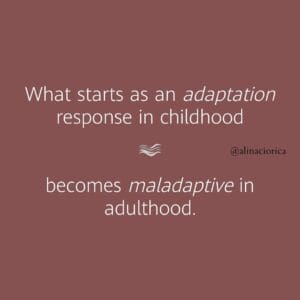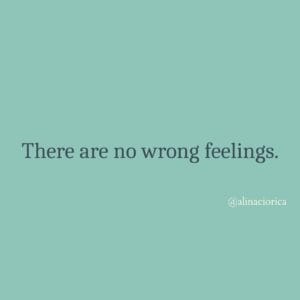Blog
food for thought & soul

You are not your child’s client and he is not your therapist. As parents, I imagine it’s tempting to show your vulnerability in relation to your child, which at some point can be healthy. It’s very important to become aware of the differences between being vulnerable and allowing yourself to be seen as humane […]



As children we survive by adapting to our environment. The adjustment and adaptation created in childhood to protect ourselves, will come to limit us as adults.
My defense mechanisms growing up was deflection and dissociation (I almost have no memories from my childhood) — which allowed me to lose contact with emotions like anger, sadness, pain and disappointment & to continue to love my parents in spite of their flaws. This is how I knew to protect my attachment relationships as a child.
I’ve continued a big part of my adult life deflecting and numbing my own needs, feelings, sensations. Until I’ve learned otherwise — to sit with my experiences, feel and stop “running away”.
We continue to live our adult lives based on adaptations learned in childhood.
We need to become aware of what no longer serves us and move beyond our survival mechanism.

It’s okay to feel whatever you’re feeling. There might be wrong actions, behaviors and practices, in the sense that they might contradict social norms and laws. But there are no wrong feelings.
You are allowed to feel whatever it is you’re feeling: love, hate, gratitude, resentment, disappointment, etc.
What creates pain and struggle is the resistance in accepting our emotions. When we meet a feeling (natural happening) with thoughts like “I shouldn’t be feeling this” or “It’s wrong to feel like this”, we come into conflict with the reality and naturalness of what we’re experiencing.
But when we allow ourselves to simply experience and feel our feelings, they will eventually shift. Emotions come and go only if we allow them to, as they are not permanent.

People often invite us to unconsciously re-enact their own life scripts (internal scenarios) and we might become whomever they need in order for this to happen.
We can become more critical, judgmental, angry, extremely worried and caring, jealous, etc. When it’s more difficult to recognise yourself from how you usually act, feel, talk, behave you might be unconsciously playing someone else’s life script.
A life script is an unconscious life plan (scenario, narrative), that we make up as children about ourselves, relationships and life in general.
For example, a big chapter of my own life script was that I had to be the good girl, always being careful about how people perceive me and putting a lot of energy into other’s opinions of me. Another chapter was that life is always a struggle, there is no time for rest and relaxation, and I need to work very hard to achieve what I want.
I’m becoming more and more aware of how I’ve invited people to unconsciously play my life script, just as I was invited to play roles in other’s life scripts.
We need strong self-awareness in order to step outside someone’s life script, by becoming ourselves. We also need to bring consciousness into what roles people play in our own lives. Are they reinforcing our life narrative?
